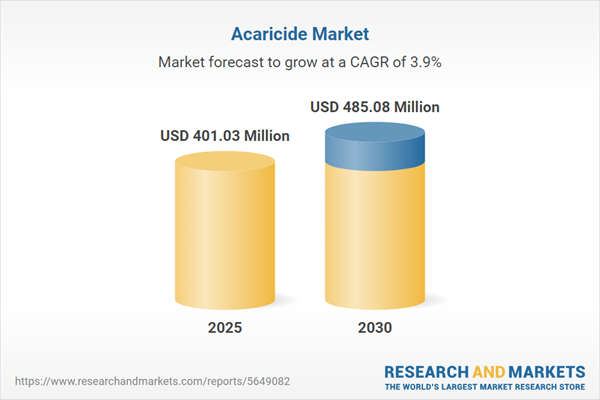Acaricides are a form of pesticide used to kill ticks and mites. Acaricides include combining chemicals like chlorinated hydrocarbons, organophosphorus compounds, carbamates, and pyrethroids. It offers key applications in eliminating rodents, pests, and other harmful organisms from food and agricultural land. Acaricides are similar to insecticides, destroying mites and preventing and repelling insects. These help in controlling tricks and also prevent the multiplication of the insects. It also offers long-lasting tick control effects and is used as an efficient solution.
The increasing global demand for agricultural products is expected to propel the acaricide market during the forecasted timeline. In the agricultural sector, acaricide helps in protecting the harvested crops from various types of insects and mites. The global demand for agricultural products witnessed significant growth, majorly with the increasing consumer preference for vegetarian and vegan food products. The acaricide market's expansion is estimated to be hindered by increasing consumer preference towards chemical-free agricultural products. Furthermore, the acaricide chemical can also lead to various types of health problems, especially neurotoxic diseases, such as paralysis.
Global acaricide market drivers
Increasing global production of the agricultural sector
The increasing global agricultural sector production is a major factor propelling the acaricides market worldwide. With the rising global demand for agricultural products, there is a need for solutions like pesticides, fertilizers, insecticides, and others. The United States Department of Agriculture, in its report, stated that in the past few years, the total area planted in the nation increased significantly. The agency stated that in 2022, the total area planted for all purposes was recorded at 88.16 million acres, which increased to 94.64 million acres in 2023. Similarly, the total production of the agricultural sector in the nation was recorded at 13,650,531 thousand bushels, which increased to 15,341,595 thousand bushels in 2023.Similarly, the Ministry of Agriculture & Farmers Welfare of the Indian Government of India, in its report, stated that in the fiscal year 2023-24, the food grain production of agricultural crops witnessed massive growth over the past few years. The department stated that foodgrain production in the nation was recorded at 3,322.98 LMT, whereas rice and wheat production was recorded at 1,378.25 LMT and 1,132.92 LMT, respectively.
Global Acaricide Market Geographical Outlooks:
Asia-Pacific is forecasted to hold a major share of the Global Acaricide Market.The Asia-Pacific region is forecasted to attain a greater share in the global acaricides market due to the growth of its agricultural sector. This region is among the leading producers of agricultural products, especially in nations like China, India, Vietnam, and Malaysia.
It is also among the global leaders in agricultural solutions, like demand for pesticides, fertilizers, and insecticides. The Foreign Agriculture Service of the US Department of Agriculture stated that in the 2023-24 FY, China, India, and Bangladesh accounted for the largest share of rice production across the globe. The total production of rice in China and India was recorded at 144.62 million MT and 137.83 million MT, respectively. In the global production of rice, China accounted for 28%, whereas India and Bangladesh accounted for 26% and 7%, respectively.
Reasons for buying this report:
- Insightful Analysis: Gain detailed market insights covering major as well as emerging geographical regions, focusing on customer segments, government policies and socio-economic factors, consumer preferences, industry verticals, other sub-segments.
- Competitive Landscape: Understand the strategic maneuvers employed by key players globally to understand possible market penetration with the correct strategy.
- Market Drivers & Future Trends: Explore the dynamic factors and pivotal market trends and how they will shape up future market developments.
- Actionable Recommendations: Utilize the insights to exercise strategic decision to uncover new business streams and revenues in a dynamic environment.
- Caters to a Wide Audience: Beneficial and cost-effective for startups, research institutions, consultants, SMEs, and large enterprises.
What do businesses use our reports for?
Industry and Market Insights, Opportunity Assessment, Product Demand Forecasting, Market Entry Strategy, Geographical Expansion, Capital Investment Decisions, Regulatory Framework & Implications, New Product Development, Competitive IntelligenceReport Coverage:
- Historical data & forecasts from 2022 to 2030
- Growth Opportunities, Challenges, Supply Chain Outlook, Regulatory Framework, Customer Behaviour, and Trend Analysis
- Competitive Positioning, Strategies, and Market Share Analysis
- Revenue Growth and Forecast Assessment of segments and regions including countries
- Company Profiling (Strategies, Products, Financial Information, and Key Developments among others)
The Global Acaricide Market is segmented and analyzed as follows:
By Type
- Natural
- Organophosphorus
- Organochlorine
- Others
By Method
- Hand Dressing
- Spray
- Dipping Vat
- Others
By Applications
- Industrial
- Animal Husbandry
- Agriculture
- Others
By Geography
- North America
- South America
- Europe
- Middle East and Africa
- Asia-Pacific
Table of Contents
Companies Mentioned
- Bayer AG
- Nichino Europe Co. Limited
- Seipasa
- ORO AGRI Group
- SAL Business Corporation (P) Ltd
- Syngenta International AG
- Corteva Agriscience
- Nissan Chemical Industries Ltd
- UPL Limited
- Safex Chemicals (India) Limited
- Gharda Chemicals Ltd
- Sumitomo Chemical India Ltd
- Indofil Industries Limited
- SummitAgro USA LLC
- Nippon Soda Co., Ltd.
Table Information
| Report Attribute | Details |
|---|---|
| No. of Pages | 132 |
| Published | December 2024 |
| Forecast Period | 2025 - 2030 |
| Estimated Market Value ( USD | $ 401.03 Million |
| Forecasted Market Value ( USD | $ 485.08 Million |
| Compound Annual Growth Rate | 3.8% |
| Regions Covered | Global |
| No. of Companies Mentioned | 15 |









